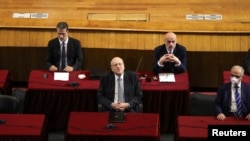Lebanon’s critical fuel shortages are showing no signs of ending despite the arrival of Iranian oil smuggled into the country through neighboring Syria. Hezbollah has been arranging the informal oil imports and prominent political and religious leaders are urging the new government to crack down on the smuggling — but Prime Minister Najib Mikati denies the government is involved.
Even Lebanon’s parliament has been hit by the rampant power outages. Monday’s session to discuss the new government’s policies was delayed by an hour because of a power cut. But many Lebanese suffer round the clock blackouts, while others wait for hours in long lines outside of gasoline stations, some of them lucky to get a quarter of a tank of gas.
Iran-backed Hezbollah has made much fanfare of its initial delivery of Iranian oil into Lebanon last week portraying itself as the country’s savior stepping in to resolve the acute energy crisis.
"This latest event gives yet another confirmation that Hezbollah has considerably increased its sway over the Lebanese state," political scientist Karim Emile Bitar told AFP. "It is no longer even trying to hide behind the veneer of legality offered by official institutions," he said.
The shipping monitor Tankertrackers.com has reported that a third Iranian tanker is on its way. Meanwhile, Iraqi fuel oil is being unloaded in southern Lebanon, according to the National News Agency.
Prime Minister Najib Mikati denies the government officially approved the oil delivery, but it certainly has not stopped it. The tankers entered Lebanon from an illegal crossing point from Syria for a transaction that threatens violation of U.S. and other sanctions.
Professor Habib Malik of the Lebanese American University tells VOA that Mikati, Hezbollah and Syria have close connections.
“This is another government borne out of Hezbollah’s agenda. Mikati, who has very strong ties with the Syrian regime, is essentially a businessman from Tripoli where he has behaved like a classic feudal lord," Malik said. "This is what’s exactly being done for the entire Lebanese population: keeping everyone on a shoestring with the absolute daily basics very scarce or absent. And then, essentially throwing people a bone here or a bone there. Lebanon is still very far from being out of the woods.”
Influential Maronite Catholic Patriarch Bechara Boutros Al-Rahi denounced the smuggling of Iranian fuel from Syria in his Sunday sermon saying, “The state cannot be built on practices or positions that contradict its entity and institutions.”
Al-Rahi said the new government should “work as a united national team to stop the collapse and confront the continuous attack attempts against the state and its democratic system.”
Observers point out that neither the arrival of Iraqi fuel to Lebanon’s state electricity company nor that of Iranian diesel have so far yielded positive results, as the country continues to struggle to keep the lights on.




